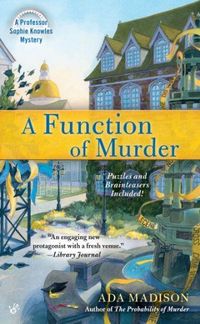 CRUEL SUMMER |
 Fall headfirst into July’s hottest stories—danger, desire, and happily-ever-afters await. |

Purchase
Professor Sophie Knowles Mystery Cozy Excerpt of A Function of Murder by Ada MadisonEXCERPT FROM CHAPTER 1
What's not to like about graduation ceremonies? The speeches? Can't get enough of them. The flowers, balloons, parties, screaming coeds? Love them all. Every year I look forward to a long line of students filing by, one by one, switching the tassels on their mortarboards. I get a shiver of delight as I join the procession, my heavy silk and velvet robes weighing me down. What a pleasure it is to walk around the pathways of the campus and onto the great lawn, Purcell's Trumpet Voluntary ringing out through the stifling hot and humid air. I never want it to end. Not. Today, as the faculty sat outside on a makeshift stage, our uncomfortable folding chairs seemed to sway with every warm breeze. Fran, my colleague in the Henley College Mathematics Department, nudged me. "Professor Knowles, are you bored silly?" she whispered. "Totally, Professor Emerson," I said. "Are you stuck to your chair?" "Like white on the blackboards," answered Fran, who was old enough to remember chalk. "Can you believe this guy? Could he be less inspiring?" Fran gave a surreptitious nod in the direction of the podium where Mayor Edward P. Graves was holding forth as our keynote speaker. The P. was important to distinguish him from his father, Edward D., and his grandfather, Edward K., who had been our mayors before him. Mayor Graves had not been the unanimous choice for commencement speaker. We'd had a last–minute cancellation and the dean had called an emergency meeting for a replacement. Many of us would have preferred a person of academic standing, like the originally scheduled speaker, who was a retired dean of a Boston medical school. Not that I'd been asked, but I'd have recommended one of any number of noted mathematicians in the greater Boston area. A sparkling equation would have made a nice addition to the commencement address. **** By ten fifteen, according to the old chimes from Franklin Hall, we decided it was time to leave. We stood and brushed off particles of dust and leaves deposited by the breeze, ready for the walk to Bruce's car, marveling at how still and lovely the campus was. The graduation hubbub and the squealing from one of the last all–female graduating classes were over. Who knew what kind of celebratory sounds the male grads would make in a couple of years? Perhaps they'd simply say, "Good job, Bro," and knock knuckles. Seemingly out of nowhere, we heard clumping noises—dragging sounds on the lawn and then shuffled footsteps on the pathway, coming from the direction of the dorms and the east end of the Administration Building. "Help!" a low, pained voice cried. "Help me!" We turned and saw a man in a light business suit staggering toward us, as if he would topple over on the next step. He looked a lot like the mayor, with auburn highlights showing up under the campus security lamps. On closer inspection—it was the mayor. I could hardly believe it. He teetered and swayed till he got to the edge of the fountain, where we'd been sitting, then fell in, head first. His commencement speech wasn't that bad, I thought, that he had to get himself wasted. How embarrassing. What was he thinking? He should be grateful that it was Bruce and I who were here and not someone from his opponent's campaign or parents with a decidedly negative opinion of him to begin with. Bruce didn't stop to judge or make a guess about what had happened or why. He snapped to it, on full alert, as if he were back in the Air Force in Saudi Arabia, or at the MAstar helipad rushing to get to an accident scene. He made it to the fountain in three long steps and lifted the mayor out by the shoulders. He laid him face down on the grass. I was confused—why didn't he put him on his back? That's what television emergency crews did when they gave CPR. Face up. Then I saw the blade sticking up in the air. Excerpt from A Function of Murder by Ada Madison |
|
| |||
|
||||




 © 2003-2025
© 2003-2025